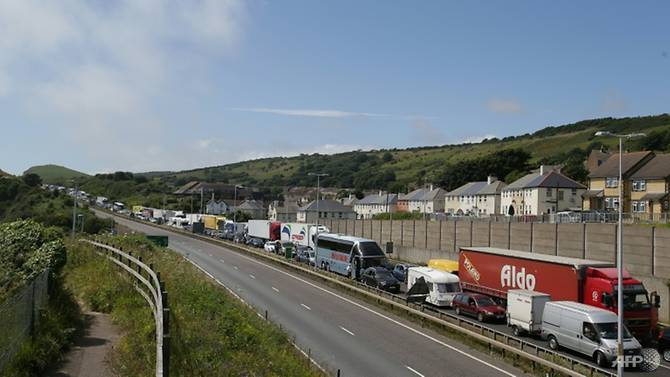UK to seek 'temporary customs union' after Brexit
 |
| Britain's membership of the EU customs union precludes it from striking its own trade deals. (Photo: AFP/Daniel Leal-Olivas) |
The government proposed to continue for around two years the kind of tariff-free arrangements that apply now to EU-UK trade in goods, to give businesses more time to adapt to new post-Brexit systems.
But unlike under the current customs union, London said it wanted to be able to negotiate free trade agreements with non-EU countries during the interim period, which would then be implemented afterwards.
Brexit minister David Davis told BBC radio it was "sensible" to have a "shortish period in which we maintain the current arrangements", lasting "something like two years".
The proposal was welcomed by the Confederation of British Industry, Britain's big business lobby group, but critics dismissed it as "fantasy".
Britain has said it will leave the EU customs union and single market - its largest trading partner - when it leaves the bloc in March 2019, but wants trade to continue as smoothly as possible.
The European Commission, the EU's executive arm, said on Tuesday that it would "take note" of the proposals, but warned: "'Frictionless trade' is not possible outside the single market and customs union."
'RED TAPE BOMBSHELL'
Experts have said it will be extremely difficult, if not impossible, to negotiate a new EU-UK trade agreement before Britain leaves the bloc, raising fears of a damaging "cliff edge".
"One possible approach would be a temporary customs union between the UK and the EU," the Brexit ministry said in a statement, as it published a policy paper on future trading relations.
The CBI's deputy director Josh Hardie said the proposal was "encouraging", adding: "The clock is ticking and what matters now is giving companies the confidence to continue investing as quickly as possible."
The policy paper set out Britain's first proposals for the future customs arrangements with the EU, including one option to streamline and simplify administrative processes for the movement of goods.
This could be similar to an arrangement between Australia and New Zealand, though the paper admitted this would see "an increase in administration compared with being inside the EU customs union".
An "innovative and untested" alternative could be a new customs partnership in which Britain adopts the EU's external customs border to allow for free EU-UK trade, but applies its own tariffs for goods from third countries destined only for Britain.
"One of the options is basically deep cooperation, and the other seems to me like continuing within the customs union but without calling it the customs union," said Professor Alan Winters, director of the UK Trade Policy Observatory at the University of Sussex.
He described the proposals as "vague and aspirational" - a view echoed by John Springford, director of research at the Centre for European Reform think tank, who accused the government of "constructive ambiguity".
Opposition Labour lawmaker Chuka Umunna, a prominent pro-European, said the government's plan was "a fantasy" - a position echoed by Guy Verhofstadt, the European Parliament's outspoken Brexit negotiator.
"They might promise frictionless trade, but they are offering a red tape bombshell for British business," Umunna said in a statement.
UNACCEPTABLE TO BREXIT VOTERS
A third round of Brexit negotiations is due to begin at the end of August, focused on Britain's financial settlement, expatriate rights, and the border between British-controlled Northern Ireland and Ireland.
London argues that customs arrangements are crucial to resolving the Irish border issue, but Brussels insists that trade talks cannot begin until there is broad agreement on the other issues.
"The quicker UK & EU 27 agree on citizens, settling accounts and Ireland, the quicker we can discuss customs and future relationship," EU chief negotiator Michel Barnier said on Twitter on Tuesday.
Leading Brexit campaigner Nigel Farage warned the proposal of the transitional deal was effectively a continuation of Britain's EU membership.
He predicted it would see continued free migration, jurisdiction of the European Court of Justice and British payments into the bloc.
"None of those three things are acceptable to Brexit voters in any way at all," he told the BBC.
What the stars mean:
★ Poor ★ ★ Promising ★★★ Good ★★★★ Very good ★★★★★ Exceptional
Latest News
More News
- Russian President congratulates Vietnamese Party leader during phone talks (January 25, 2026 | 09:58)
- Worldwide congratulations underscore confidence in Vietnam’s 14th Party Congress (January 23, 2026 | 09:02)
- Political parties, organisations, int’l friends send congratulations to 14th National Party Congress (January 22, 2026 | 09:33)
- 14th National Party Congress: Japanese media highlight Vietnam’s growth targets (January 21, 2026 | 09:46)
- 14th National Party Congress: Driving force for Vietnam to continue renewal, innovation, breakthroughs (January 21, 2026 | 09:42)
- Vietnam remains spiritual support for progressive forces: Colombian party leader (January 21, 2026 | 08:00)
- Int'l media provides large coverage of 14th National Party Congress's first working day (January 20, 2026 | 09:09)
- Vietnamese firms win top honours at ASEAN Digital Awards (January 16, 2026 | 16:45)
- ASEAN Digital Ministers' Meeting opens in Hanoi (January 15, 2026 | 15:33)
- ASEAN economies move up the global chip value chain (December 09, 2025 | 13:32)
















 Mobile Version
Mobile Version